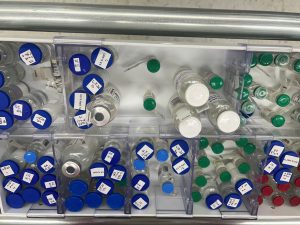Axia Designs New Test Protocols for Pharmaceutical RFID Tags
February 2025
Adopted as global standard by GS1
The Axia Lab™ of Michigan State University recently concluded leading an initiative to create a new test protocol for grading the performance of radio frequency identification (RFID) tags used on pharmaceutical vial items. The proposed grades used the first testing methodology developed by Axia Lab, which started in 2021; and are the first globally accepted grading standards adopted by GS1 in the healthcare/ pharmaceutical category within the Tagged-Item Performance Protocol (TIPP).
testing methodology developed by Axia Lab, which started in 2021; and are the first globally accepted grading standards adopted by GS1 in the healthcare/ pharmaceutical category within the Tagged-Item Performance Protocol (TIPP).
GS1 is a neutral, global collaboration of industry leaders, governments, regulators, academia, and associations that develop standards-based solutions. The first version of the TIPP document was published by GS1 in 2017. The new pharmaceutical grades proposed by the Axia Lab, were reviewed and approved first by the GS1 Global Identification (ID) Standards Maintenance Group (SMG) and then approved for publication after the community review. Three new grades were included in an updated version of the GS1 Tagged-Item Performance Protocol (TIPP) Guidelines, first published in May 2024.
RFID Standards Begin in Retail
For the past two decades, GS1 has systematically led workgroups to define the testing, protocols, and grading for RFID-tagged items in the retail and apparel industry. Walmart is the largest company to incorporate the use of RFID for supply chain traceability, inventory management, and theft prevention. The retailer has demonstrated efficiencies throughout its supply chain and can show increased customer satisfaction rates when products are on shelves.
Other industries, including healthcare, pharmaceuticals, food packaging and more are taking notice and are preparing to adapt the technology for new applications.
New Applications Expand RFID Performance Testing
“Traceability and patient safety are critical elements in the healthcare supply chain, which RFID tags are designed to enhance,” said Dr. Bahar Aliakbarian, Associate Professor in Michigan State University’s Biosystems and Agricultural Engineering Department and the Axia Institute’s Sr. Director of Research & Development.
Once RFID adoption gains momentum, there will be a need for globally accepted protocols to test and validate the performance of RFID-tagged items, known as TIPP. The Axia Lab is a premier research lab leading the way in RFID-tagged item assessments, testing, compliance, and technical implementations according to GS1 standards.
“Our lab is a neutral exploration ground that collaborates with industry to accelerate standards adoption. We test using actual products in real-world applications using GS1 TIPP standards as our foundation. From there, we are making recommendations for new performance requirements, in the instance of pharmaceutical products, it is minimum sensitivity and backscatter,” said Aliakbarian.
The unique collaboration between industry and organizations establishing global guidelines allows Axia to leverage existing knowledge of RFID performance to new applications.
“There are substantial differences between the retail and apparel industry and the pharmaceutical and healthcare sectors in assessing RFID performance,” said Ethan Claucherty, Axia’s Lead Laboratory Technologist. “However, as with any TIPP definition, the new guidelines are universally applicable and straightforward to implement across diverse settings.”
The use of RFID-tagged items is expected to increase in the pharmaceutical and other industries, paving the way for additional performance tests and validation analysis. Axia Lab is prepared to develop new protocols and ensure compliance with global standards and partner with industry to simplify and speed up RFID adoption.
###
About The Axia Institute
As a premier value chain innovation center, The Axia Institute® is dedicated to improving Healthcare, Food & Agriculture and Advanced Manufacturing value chains through industry collaboration, applied research and education. Established by Michigan State University in 2013 in Midland, Mich., The Axia Institute and its Axia Lab are part of MSU’s Office of Research and Innovation.
More than 30 companies are member partners who align to three industry-specific consortia groups to collaborate and solve grand challenges that would be difficult to resolve alone. Developing sustainable and revolutionary solutions is driven by our expertise in value chain digitization, value chain optimization, traceability, circular economy, packaging design, fundamental R&D, and talent development.
For more information, see axia.msu.edu.
About Axia Lab
The Axia Lab™ is an impartial testing and research lab advancing innovative and sustainable value chain solutions. The Axia Lab, which opened in 2021, specializes in testing radio frequency identification (RFID) tagged items following GS1 standards. It is accredited by the ANSI National Accreditation Board (ANAB) to ISO/IEC 17025:2017 in the field of testing. In the pursuit of research excellence, The Axia Lab created a new test protocol for grading the performance of RFID tags used on healthcare vial items in 2024. These proposed grades are the first developed testing methodology for Axia Lab and are the first globally accepted grading system adopted by GS1 in the healthcare/ pharmaceutical category within the Tagged-Item Performance Protocol (TIPP).
For more information about Axia Lab, please see lab.axia.msu.edu.
Partnerships:
Collaborating for Success
Bridging the gap from theory to real-world application.
Education:
Developing Your Skills
Graduate studies, certificate programs and seminars in value chain creation and optimization.
Contact:
The Axia Institute
Have questions? Learn more about how you can get involved with The Axia Institute.
